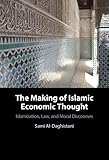The making of Islamic economic thought : Islamization, law and moral discourses / Sami Al-Daghistani
نوع المادة : نصتفاصيل النشر:Cambridge : Cambridge University Press, 2022 وصف:(xi, 323 p.)تدمك:
نصتفاصيل النشر:Cambridge : Cambridge University Press, 2022 وصف:(xi, 323 p.)تدمك:- 978-1-108-84575-5
- 277.52 23A
- 277.5
| نوع المادة | المكتبة الحالية | رقم الطلب | رقم النسخة | حالة | تاريخ الإستحقاق | الباركود | |
|---|---|---|---|---|---|---|---|
|
|
Bibliothèque centrale En accès libre | 277.5 / 954 (إستعراض الرف(يفتح أدناه)) | 1 | المتاح | 000007810817 |
Browsing Bibliothèque centrale shelves, Shelving location: En accès libre إغلاق مستعرض الرف(يخفي مستعرض الرف)
Interrogating the development and conceptual framework of economic thought in the Islamic tradition pertaining to ethical, philosophical, and theological ideas, this book provides a critique of modern Islamic economics as a hybrid economic system. From the outset, Sami Al-Daghistani is concerned with the polyvalent methodology of studying the phenomenon of Islamic economic thought as a human science in that it nurtures a complex plentitude of meanings and interpretations associated with the moral self. By studying legal scholars, theologians, and Sufis in the classical period, Al-Daghistani looks at economic thought in the context of Sharī'a's moral law. Alongside critiquing modern developments of Islamic economics, he puts forward an idea for a plural epistemology of Islam's moral economy, which advocates for a multifaceted hermeneutical reading of the subject in light of a moral law, embedded in a particular cosmology of human relationality, metaphysical intelligibility, and economic subjectivity.
لا توجد تعليقات على هذا العنوان.














